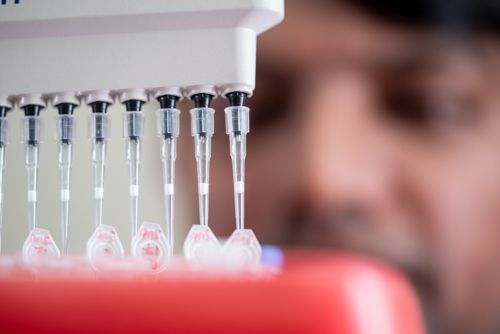St. Jude Family of Websites
Explore our cutting edge research, world-class patient care, career opportunities and more.
St. Jude Children's Research Hospital Home

- Fundraising
St. Jude Family of Websites
Explore our cutting edge research, world-class patient care, career opportunities and more.
St. Jude Children's Research Hospital Home

- Fundraising
Markos Leggas Lab
Leading translational pharmacology efforts to assess the clinical use of existing drugs and new drug candidates
About the Markos Leggas Lab
Bringing treatments from the laboratory bench to a patient is a journey marked by extensive research. Our laboratory conducts research to assess the properties and behavior of existing drugs or new drug candidates to optimize their clinical use. We have two major projects: one to develop a new targeted therapy for Ewing sarcoma and another to assess the utility of a non-opioid medication to treat neonates physically dependent on opioids.

Our research summary
The oncogenic transcription factor, EWS-FLI1, is recognized as the Achilles heel of Ewing sarcoma. However, efforts to develop treatments that interfere with its function have not succeeded. To close this gap between and identifying the molecular driver of disease and developing an effective treatment, we evaluate semi-synthetically modified mithramycin analogs, which have been shown to interfere with the oncogenic transcription factor responsible for Ewing sarcoma growth. Currently, several analogs are progressing through preclinical evaluation and, if successful, will transition to the NCI Experimental Therapeutics program to complete the preclinical evaluations required for entry into the clinic.

Our work also focuses on a randomized controlled clinical trial that evaluates the use of clonidine — an alpha-2 adrenoceptor agonist — in comparison to morphine for the treatment of neonates who are born physically dependent on opioids due to prenatal exposure. We are using population PK/PD to describe the exposure and response of each treatment in the neonates. We also attempt to understand the sources of variability in drug exposure and response through population covariate modeling that includes the pharmacogenetics of genes responsible for the transport, metabolism and pharmacological action of each drug. Our previous contributions to this area include the study of neonatal opioid exposure by analyzing the clinical utility of the Finnegan neonatal abstinence scoring tools and examining the biochemical and behavioral alterations that occur because of opioid exposure. These efforts contribute to early diagnosis and treatment of neonatal opioid withdrawal syndrome (NOWS).

Publications
Contact us
Markos Leggas, PhD
Member, St. Jude Faculty
Director, Center for Translational Pharmacology
Department of Pharmacy and Pharmaceutical Sciences
MS 313, Room I5104
St. Jude Children's Research Hospital

Memphis, TN, 38105-3678 USA GET DIRECTIONS